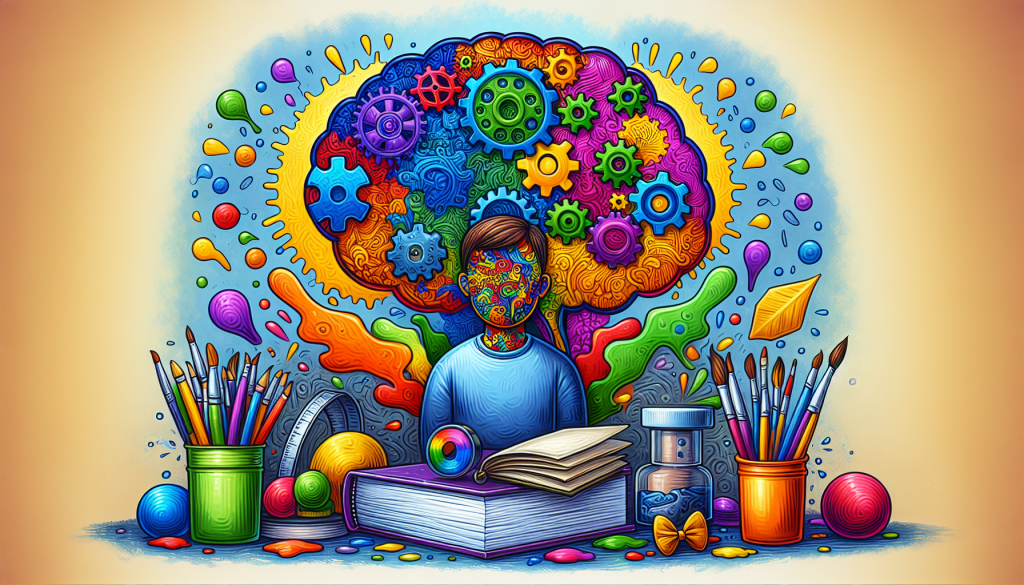Are autistic people smart? The answer varies. Autistic individuals exhibit a wide range of cognitive abilities. Some have extraordinary talents, while others face challenges. This article will explore these diverse abilities, debunk myths, and highlight unique strengths in the autism community.
Key Takeaways
- Intelligence in autistic individuals is diverse, ranging from intellectual disabilities to exceptional talents, challenging traditional notions of intelligence.
- Common strengths among autistic individuals include exceptional memory, attention to detail, and hyperfocus on specific interests, which can be advantageous in various fields.
- Traditional IQ tests may not accurately reflect the cognitive abilities of autistic individuals, highlighting the need for alternative assessment methods that acknowledge non-verbal intelligence.
Understanding Intelligence in Autism Spectrum Disorder

Intelligence is a multifaceted concept that extends beyond traditional measures, and this complexity is especially evident in autism spectrum disorder (ASD). The relationship between autism and intelligence is not straightforward, varying widely among individuals. Some autistic people may exhibit unique cognitive abilities, while others might face intellectual disability challenges.
Recognizing that the autism spectrum covers a wide range of abilities and challenges helps reflect the cognitive diversity within the autism community. Not all autistic individuals possess high intelligence, and the spectrum includes a broad range of intellectual capabilities. Understanding these variations helps us appreciate the strengths and challenges of autistic individuals, moving beyond stereotypes and misconceptions.
Debunking Myths About Autism and Intelligence
One prevalent myth is that all autistic individuals are either savants or possess extraordinary abilities. While some autistic individuals do exhibit exceptional talents, this is not the case for the majority. The notion that autistic people are inherently geniuses or have intellectual disabilities is a stereotype that needs to be dismantled. Intelligence levels among autistic individuals vary widely, and not all will display genius-level talents.
Education and awareness programs are critical for promoting understanding and acceptance of autistic individuals. Increasing awareness about autism can help dismantle these stereotypes and misconceptions, fostering a more inclusive society. Acknowledging and celebrating the unique abilities of autistic individuals helps challenge stereotypes and promotes a more nuanced understanding of autism.
Recognizing the individuality of autistic people and celebrating their unique strengths and weaknesses is vital. Autistic individuals may struggle with social interactions or verbal communication but can excel in fields such as mathematics, visual-spatial skills, music, or art. This diversity in abilities underscores the need to avoid generalizations based on traditional measures when assessing intelligence in autistic individuals.
The Range of Cognitive Abilities in Autism
The cognitive abilities of autistic individuals can range from having intellectual disabilities to displaying exceptional talents in specific domains. Some individuals with autism possess average or above-average intelligence, while others may experience intellectual disabilities. This wide range of cognitive abilities reflects the diverse nature of the autism spectrum disorder.
Within the autism community, we find a variety of intellectual abilities and strengths. Some autistic individuals exhibit exceptional skills, such as remarkable memory or attention to detail, which allows them to excel in specific areas. Recognizing this diversity helps us better understand and appreciate the unique cognitive profiles of autistic individuals.
Unique Cognitive Strengths in Autistic Individuals

Many autistic individuals possess unique cognitive abilities that challenge traditional views of intelligence, illustrating the diversity within the autism spectrum. These strengths often include exceptional memory, attention to detail, and the ability to achieve hyperfocus on specific interests. These cognitive traits can lead to impressive outcomes in various fields.
Understanding these unique strengths allows better support and nurturing of the talents of autistic individuals. The following subsections will delve deeper into specific cognitive strengths such as exceptional memory and specialized interests, providing a comprehensive view of the remarkable abilities within the autism community.
Exceptional Memory and Detail Orientation
Autistic individuals often demonstrate exceptional memory and attention to detail, which can be significant advantages in many contexts. They can recall extensive information with remarkable accuracy, a trait that is beneficial in educational settings and various professional fields. This exceptional memory is a common trait among autistic individuals and is often linked to their ability to process information in a detailed and specific manner.
The cognitive trait of weak central coherence, which many autistic individuals possess, allows them to focus on specific details and grasp intricate concepts and patterns deeply. This heightened ability to process information and recognize patterns can lead to unique insights and innovative problem-solving capabilities.
Fields that require precision, such as engineering and scientific research, often benefit from the remarkable attention to detail exhibited by autistic individuals.
Specialized Interests and Hyperfocus
Hyperfocus is another cognitive strength commonly seen in autistic individuals, referring to their intense focus and concentration on specific interests or topics. This intense focus enables them to acquire extensive knowledge and develop expertise in their areas of interest. For example, there is a higher prevalence of autism traits among individuals in STEM careers, indicating the link between specialized interests and intelligence.
Heightened sensory sensitivity in some autistic individuals can also lead to exceptional skills in areas such as visual arts and music. Savant syndrome, characterized by exceptional talent or ability in a specific area, often results from this intense specialization and focus.
This hyperfocus allows autistic individuals to achieve remarkable expertise and skills in their chosen fields, showcasing their unique cognitive strengths.
Diverse Forms of Intelligence in Autism

Intelligence in autistic individuals is complex and varies widely, with some having average or above-average capabilities. Recognizing the cognitive abilities of individuals with autism challenges traditional notions of intelligence and highlights their unique strengths. The theory of multiple intelligences, which includes different types of intelligence beyond a single measure like IQ, is particularly relevant here.
It is essential to understand the various types of intelligence in autism. This understanding helps to appreciate the unique talents and strengths of autistic individuals. We will explore three specific types of intelligence—visual-spatial, logical-mathematical, and verbal skills—in the following subsections to provide a more comprehensive view of the cognitive diversity within the autism spectrum disorder.
Visual-Spatial Intelligence
Visual-spatial intelligence is the capacity to perceive and manipulate visual information accurately, a skill often associated with strong spatial reasoning, pattern recognition, and visual problem-solving. Many autistic individuals excel in visual tasks, which can lead to successful careers in fields such as architecture, design, and engineering.
Their ability to process and interpret visual information with precision is a notable strength that sets them apart in these fields.
Logical-Mathematical Intelligence
Autistic individuals often exhibit logical-mathematical intelligence, encompassing logical reasoning, mathematical thinking, and problem-solving skills. This type of intelligence is characterized by an intense focus, a desire for precision, and an analytical approach to learning, demonstrating that autistic people smart.
These traits can lead to exceptional performance in areas like programming and data analysis, where logical and mathematical skills are paramount.
Verbal Skills in Autism
Verbal intelligence among autistic individuals can vary considerably, with some displaying remarkable abilities such as extensive vocabulary, advanced grammatical skills, and exceptional recall. Despite challenges in social communication that some may face, others might excel in areas requiring strong verbal skills, showcasing the diversity of cognitive abilities within the autism spectrum.
Factors Influencing Intelligence in Autism

Several factors influence intelligence in autistic individuals, including genetic and neurological elements. Scientific research indicates a positive genetic correlation between autism and high intelligence, suggesting that families with autism are more likely to have individuals demonstrating extreme intelligence. This genetic link highlights the potential for exceptional cognitive abilities within the autism community.
Neurotransmitters, brain development, and altered chemical messengers such as GABA also play significant roles in shaping cognitive abilities in individuals with autism. The unique brain structure of autistic individuals can enhance certain cognitive abilities while affecting overall IQ scores. Despite lower overall IQ, many autistic individuals show enhancements in specific domains, reflecting a range of strengths and weaknesses.
Factors such as access to education, socioeconomic status, and mental health also contribute to the variability of intelligence in individuals with autism. Understanding these influences helps us better support and nurture the cognitive strengths of autistic individuals.
Genetic Correlation with High Intelligence
Research shows a positive genetic correlation between autism and high intelligence, with families of autistic individuals more likely to produce children with extreme intelligence. Studies, including one from Ohio State University, reveal that autistic individuals may exhibit greater cognitive capabilities compared to their non-autistic peers. However, intelligence levels vary widely within the autism community, making it essential to avoid generalizations based on the diagnosis alone.
Acknowledging the strengths of autistic individuals is crucial for challenging stereotypes and contributing to a more comprehensive understanding of intelligence. Recognizing these genetic links helps us appreciate the potential for exceptional cognitive abilities within the autism community.
Brain Connectivity and Enhanced Perceptual Functioning
Alterations in brain connectivity can lead to better performance in tasks relying on specific cognitive functions for autistic individuals. Unique brain structures, such as increased folding in certain lobes, are associated with enhanced perceptual processing in autistic individuals.
These structural differences can result in heightened abilities in areas like pattern recognition and visual-spatial tasks, showcasing the unique cognitive strengths of autistic individuals.
Supporting Autistic Individuals' Strengths

Understanding and appreciating the unique strengths of autistic individuals is crucial for supporting their development and well-being. Specialized interests can serve as a source of motivation and fulfillment, driving autistic individuals to achieve remarkable accomplishments. An inclusive atmosphere is essential for autistic individuals. It enables them to thrive and reach their full potential.
A strength-based approach helps build confidence and promotes self-advocacy in autistic individuals. Recognizing and nurturing their unique talents supports autistic individuals in realizing their full potential.
Providing Accommodations and Support
Creating an inclusive environment that values the strengths and challenges of autistic individuals is essential for their overall success. Providing accommodations like sensory-friendly classrooms and quiet spaces can greatly assist autistic individuals in educational settings. Support and resources such as counseling services, peer support groups, and development of social skills can significantly aid autistic individuals.
Empowering autistic individuals involves recognizing their potential and providing effective communication methods to foster self-advocacy. Offering these supports helps autistic individuals navigate their environments more effectively.
Celebrating Success Stories
Numerous autistic individuals have made significant contributions across various fields, showcasing their exceptional talents. Celebrating these success stories highlights the remarkable achievements of autistic individuals and serves as an inspiration to others.
Acknowledging their accomplishments promotes a more inclusive and supportive environment for all.
Navigating Challenges in Traditional Intelligence Measures
Traditional intelligence measures may not fully capture the unique abilities of autistic individuals. These assessments often rely heavily on verbal communication and language skills, which may disadvantage autistic individuals and fail to reflect their true cognitive strengths. As a result, many autistic individuals might not perform well on standard IQ tests, even if they possess exceptional cognitive abilities.
Despite these challenges, some autistic individuals perform exceptionally well on intelligence tests, with some scoring in the gifted range (140+ IQ). Advanced analytical thinking and problem-solving skills, especially in tests like Raven’s Matrices, are common among autistic individuals.
However, traditional measures may not always be the best indicators of intelligence for autistic individuals.
Limitations of Standard IQ Tests
Standard IQ tests often do not assess critical areas like emotional and social intelligence, which are important aspects of overall cognitive abilities. These tests may not be accurate measures of abilities for autistic individuals, as they rely heavily on verbal communication and language skills.
Many autistic individuals show varied IQ results compared to non-autistic individuals, with some studies indicating higher nonverbal IQ scores. This variability highlights the need for alternative assessment methods.
Alternative Assessment Methods
Non-verbal intelligence tests can better evaluate the cognitive strengths of autistic individuals. These alternative methods acknowledge and highlight the unique cognitive strengths often found in autistic individuals, providing a more accurate assessment of their abilities.
Diverse assessment methodologies help ensure that the varied abilities among autistic individuals are recognized and valued. Such approaches are essential for truly understanding the intelligence of autistic individuals.
Promoting Neurodiversity and Inclusion
Neurodiversity recognizes and accepts a diverse range of neurological differences, including autism. Unique strengths and achievements within the autistic community should be celebrated for their exceptional contributions. Accepting autism as a unique way of experiencing the world is essential for harnessing the potential of autistic individuals. To benefit from the unique abilities of autistic individuals, society must embrace neurodiversity and foster inclusive environments.
An inclusive society that values and supports the diverse abilities of autistic individuals can help them thrive and reach their full potential. Promoting neurodiversity and creating an inclusive, supportive environment ensures that the talents and strengths of autistic individuals are recognized and celebrated.
Fostering an Inclusive Environment
Challenging stereotypes and recognizing the diversity of abilities is crucial for fostering understanding in society about autism. Creating an inclusive environment involves providing support and accommodations that cater to the unique needs of autistic individuals.
This approach helps autistic individuals thrive and reach their full potential, contributing to a more accepting and inclusive society.
Educating Society About Autism
Educating society about autism is crucial to fostering understanding and empathy. Increased awareness and education can help dismantle stereotypes and misconceptions about autistic individuals, promoting acceptance and support systems within the autism community.
Educating society helps create a more inclusive environment where autistic individuals are valued for their unique strengths and contributions.
Summary
The journey to decode intelligence in autistic individuals reveals a complex and nuanced picture. Intelligence within the autism spectrum disorder is multifaceted and varies widely among individuals. From exceptional memory and attention to detail to specialized interests and hyperfocus, autistic individuals possess unique cognitive strengths that challenge traditional measures of intelligence.
By understanding and appreciating these diverse forms of intelligence, we can better support and nurture the talents of autistic individuals. Creating an inclusive and supportive environment, promoting neurodiversity, and educating society about autism are essential steps towards harnessing the potential of autistic individuals. Let us celebrate their remarkable achievements and continue to foster a world where their unique strengths are recognized and valued.
Frequently Asked Questions
Are all autistic individuals exceptionally intelligent?
Not all autistic individuals are exceptionally intelligent; intelligence levels vary widely, with some experiencing intellectual disabilities while others possess exceptional cognitive abilities.
What are some common cognitive strengths of autistic individuals?
Autistic individuals often exhibit exceptional memory, strong attention to detail, specialized interests, and hyperfocus, which can lead to notable accomplishments in specific fields. These cognitive strengths highlight their unique capabilities.
Why do traditional IQ tests not accurately reflect the intelligence of autistic individuals?
Traditional IQ tests do not accurately reflect the intelligence of autistic individuals because they heavily emphasize verbal communication and language skills, areas where many autistic individuals may struggle. Additionally, these tests fail to evaluate crucial aspects of intelligence such as emotional and social understanding.
How can we better support the strengths of autistic individuals?
To better support the strengths of autistic individuals, it is crucial to provide sensory-friendly environments, tailored support services, and effective communication methods. Additionally, fostering an inclusive society that celebrates their unique achievements will significantly enhance their well-being.
What is neurodiversity, and why is it important?
Neurodiversity acknowledges a spectrum of neurological differences, including autism, and it is vital for fostering inclusivity and leveraging the unique strengths of autistic individuals. Embracing this concept promotes a richer, more diverse society that values all forms of cognition.
